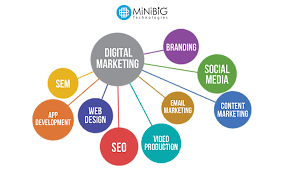The Power of Online Content Marketing Strategy
In today’s digital age, a robust online content marketing strategy is crucial for businesses looking to engage with their target audience, build brand awareness, and drive conversions. Content marketing involves creating and distributing valuable, relevant, and consistent content to attract and retain a clearly defined audience.
Key Components of an Effective Online Content Marketing Strategy:
- Define Your Goals: Clearly outline what you want to achieve with your content marketing efforts. Whether it’s increasing website traffic, generating leads, or improving brand loyalty, setting specific goals will guide your strategy.
- Know Your Audience: Understanding your target audience’s needs, preferences, and pain points is essential for creating content that resonates with them. Conduct thorough research to identify your audience demographics and interests.
- Create High-Quality Content: Develop engaging and informative content that adds value to your audience. This can include blog posts, videos, infographics, case studies, whitepapers, and more.
- Optimise for SEO: Incorporate relevant keywords and optimise your content for search engines to improve its visibility online. SEO-friendly content helps drive organic traffic to your website.
- Promote Your Content: Utilise various channels such as social media, email marketing, influencer partnerships, and guest blogging to amplify the reach of your content. Effective promotion is key to maximising its impact.
- Analyse and Iterate: Monitor the performance of your content using analytics tools to track key metrics such as engagement rates, click-through rates, and conversion rates. Use this data to refine your strategy for continuous improvement.
The Benefits of a Strong Online Content Marketing Strategy:
An effective online content marketing strategy offers numerous benefits for businesses:
- Increased Brand Visibility: Consistent publishing of high-quality content helps boost brand visibility and recognition among your target audience.
- Enhanced Customer Engagement: Engaging content encourages interaction with customers, fostering relationships and building trust in your brand.
- Improved Search Engine Rankings: SEO-optimised content can improve your website’s ranking on search engine results pages (SERPs), driving organic traffic.
- Lead Generation: Valuable content attracts potential customers and nurtures them through the sales funnel towards conversion.
- Elevated Brand Authority: Providing authoritative and informative content establishes your brand as a thought leader in your industry.
In conclusion, a well-planned online content marketing strategy is a powerful tool for businesses seeking to connect with their target audience effectively. By creating valuable content that resonates with users and promoting it across various channels, businesses can enhance their online presence, drive engagement, and ultimately achieve their marketing goals.
Seven Advantages of Online Content Marketing Strategy: Boosting Visibility, Engagement, and Authority
- Increased brand visibility
- Enhanced customer engagement
- Improved search engine rankings
- Lead generation
- Elevated brand authority
- Cost-effective compared to traditional marketing methods
- Ability to target specific audience segments
Challenges of Online Content Marketing Strategies: Time, Trends, and Quality Concerns
- 1. Content creation can be time-consuming and resource-intensive.
- 2. It may take time to see tangible results and ROI from content marketing efforts.
- 3. Keeping up with changing algorithms and trends in digital marketing can be challenging.
- 4. Content saturation on the internet can make it difficult to stand out and reach your target audience.
- 5. Inconsistent or low-quality content can damage brand reputation and credibility.
Increased brand visibility
Increased brand visibility is a significant advantage of implementing an online content marketing strategy. By consistently creating and sharing high-quality content across digital channels, businesses can enhance their presence and recognition among their target audience. With each piece of engaging content shared, the brand’s visibility expands, reaching a wider audience and reinforcing its position in the market. This increased visibility not only attracts potential customers but also establishes the brand as a reputable authority in its industry, ultimately leading to greater brand awareness and recognition.
Enhanced customer engagement
Enhanced customer engagement is a significant advantage of implementing an online content marketing strategy. By creating and sharing valuable and relevant content with your target audience, you can foster meaningful interactions, encourage feedback, and build relationships with customers. Engaged customers are more likely to interact with your brand, share your content, and become loyal advocates for your products or services. This increased engagement not only strengthens brand loyalty but also helps drive conversions and long-term customer retention.
Improved search engine rankings
One significant advantage of implementing an online content marketing strategy is the potential for improved search engine rankings. By creating high-quality, SEO-optimised content that resonates with your target audience and aligns with relevant keywords, businesses can enhance their visibility on search engine results pages (SERPs). This increased visibility not only drives organic traffic to the website but also boosts brand credibility and authority in the eyes of both users and search engines. Ultimately, improved search engine rankings through effective content marketing can lead to a higher likelihood of attracting qualified leads and converting them into loyal customers.
Lead generation
Lead generation is a significant benefit of implementing an online content marketing strategy. By creating valuable and engaging content tailored to the needs and interests of your target audience, businesses can attract potential customers and capture their interest. Through strategic content distribution across various online channels, businesses can generate leads, nurture them through the sales funnel, and ultimately convert them into loyal customers. Effective lead generation through content marketing not only increases sales opportunities but also helps build long-lasting relationships with prospects, driving business growth and success.
Elevated brand authority
Elevated brand authority is a significant advantage of implementing an online content marketing strategy. By consistently producing high-quality and informative content that positions the brand as a trusted source of information within its industry, businesses can establish themselves as thought leaders. This enhanced credibility not only builds trust with the target audience but also sets the brand apart from competitors, ultimately leading to increased brand recognition and customer loyalty.
Cost-effective compared to traditional marketing methods
Online content marketing strategy offers a significant advantage in terms of cost-effectiveness when compared to traditional marketing methods. By creating and distributing valuable content online, businesses can reach a wide audience at a fraction of the cost associated with traditional advertising channels such as print, TV, or radio. With online content marketing, businesses can engage with their target audience through various digital platforms without the high expenses typically associated with traditional marketing campaigns. This cost-efficient approach allows businesses to allocate their resources more effectively and achieve a higher return on investment in reaching and engaging with their audience.
Ability to target specific audience segments
One significant advantage of an online content marketing strategy is its ability to target specific audience segments with precision. By creating tailored content that addresses the unique needs, interests, and preferences of different demographic groups or buyer personas, businesses can effectively engage with their target audience on a more personal level. This targeted approach not only increases the relevance and value of the content to the audience but also enhances the likelihood of driving conversions and building long-term relationships with customers who resonate with the messaging.
1. Content creation can be time-consuming and resource-intensive.
One significant drawback of online content marketing strategy is that content creation can be a time-consuming and resource-intensive process. Developing high-quality and engaging content requires careful planning, research, writing, designing, and editing, which can consume a considerable amount of time and resources. Businesses may need to allocate dedicated staff or outsource content creation to meet the demands of a robust content marketing strategy, leading to increased costs and potential challenges in maintaining consistency and relevance across various digital platforms.
2. It may take time to see tangible results and ROI from content marketing efforts.
One significant drawback of online content marketing strategy is the time it may take to see tangible results and return on investment (ROI) from the efforts invested. Unlike some forms of marketing that yield immediate outcomes, content marketing often requires a long-term commitment before significant results are realised. Building brand awareness, establishing credibility, and nurturing customer relationships through valuable content can be a gradual process that demands patience and consistent effort. Businesses must understand that the benefits of content marketing may not be instantaneous but can deliver substantial returns over time with persistence and strategic execution.
3. Keeping up with changing algorithms and trends in digital marketing can be challenging.
Keeping up with changing algorithms and trends in digital marketing can present a significant challenge for businesses implementing an online content marketing strategy. As search engine algorithms evolve and consumer preferences shift, staying abreast of these changes is essential to maintain visibility and relevance in the online landscape. Failure to adapt to emerging trends and algorithm updates can result in diminished reach and effectiveness of content marketing efforts, highlighting the importance of continuous monitoring and adjustment to ensure sustained success in the dynamic digital marketing environment.
4. Content saturation on the internet can make it difficult to stand out and reach your target audience.
In the realm of online content marketing strategy, a significant drawback arises from the pervasive content saturation on the internet. The sheer volume of content available can create a challenging environment for businesses aiming to differentiate themselves and connect with their target audience effectively. With countless pieces of content vying for attention, standing out amidst the noise and capturing the audience’s interest becomes increasingly difficult. This saturation can dilute the impact of individual efforts, making it essential for businesses to adopt innovative and strategic approaches to cut through the clutter and make a lasting impression on their intended viewers.
5. Inconsistent or low-quality content can damage brand reputation and credibility.
Inconsistent or low-quality content within an online content marketing strategy can have detrimental effects on a brand’s reputation and credibility. When audiences encounter content that is poorly executed, inaccurate, or lacks value, they may perceive the brand as unprofessional or unreliable. This can erode trust with existing customers and deter potential customers from engaging further with the brand. Consistency and quality are essential in maintaining a positive brand image and establishing credibility in the competitive digital landscape.


